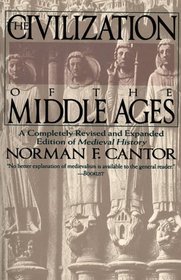The book depicts the fall of Rome that allowed the church to become powerful, and examines the church's relationship with the nations that grew out of the Roman decline. There is a lot of detail and a lot of analysis, and the book is a very big bite of history.
One annoying thing I noticed was that Cantor jumped around in a way that I found distracting. Moving forward from major historical events triggered by a pope, for instance, and moving into the next pope's period, the book might then jump back a century (longer or shorter, depending on what the subject) and expound in detail about something that I feel should have been moved to its proper place in a preceding chapter or earlier in the same chapter. It was annoying, but having said that, perhaps the fact that Cantor DID go back and reinforce with more detail that which he already had discussed, expandomh detail and reinforcing the relevance of past events going forward, I learned more than I had on other readings, and am clearer on how events of the middle ages affected eras, even up to today.
I enjoyed this book, but it take time (and patience) to read.
One annoying thing I noticed was that Cantor jumped around in a way that I found distracting. Moving forward from major historical events triggered by a pope, for instance, and moving into the next pope's period, the book might then jump back a century (longer or shorter, depending on what the subject) and expound in detail about something that I feel should have been moved to its proper place in a preceding chapter or earlier in the same chapter. It was annoying, but having said that, perhaps the fact that Cantor DID go back and reinforce with more detail that which he already had discussed, expandomh detail and reinforcing the relevance of past events going forward, I learned more than I had on other readings, and am clearer on how events of the middle ages affected eras, even up to today.
I enjoyed this book, but it take time (and patience) to read.




